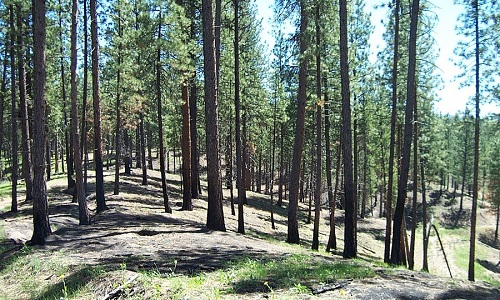This field tour visited one of the National Fire-Fire Surrogate Study Sites at the University of Montana’s Lubrecht Experimental Forest. This study, initiated in 1999, evaluates the effects of thinning and burning treatments in fire-adapted ponderosa pine-mixed conifer forests. Participants discussed short and mid-term treatment effects, including stand dynamics, fuel treatment longevity, potential fire behavior, bark beetle activity, and soil productivity.
- Ilana Abrahamson, Supervisory Ecologist, Rocky Mountain Research Station - Fire, Fuel and Smoke Science Program
- Cory Cleveland, Professor of Terrestrial Ecosystem Ecology, W.A. Franke College of Forestry and Conservation, University of Montana
- Justin Crotteau, Graduate Student, W.A. Franke College of Forestry and Conservation, University of Montana
- Tom DeLuca, Dean and Professor, W.A. Franke College of Forestry and Conservation, University of Montana
- Carl Fiedler, Research Professor of Silviculture, W.A. Franke College of Forestry and Conservation, University of Montana
- Mick Harrington, Research Forester (Retired), Rocky Mountain Research Station - Fire, Fuel and Smoke Science Program
- Sharon Hood, Research Ecologist, Rocky Mountain Research Station - Fire, Fuel and Smoke Science Program
- Chris Keyes, Research Professor of Silviculture, W.A. Franke College of Forestry and Conservation, University of Montana
The field tour opened with brief background and topic discussions in the lecture hall at Lubrecht Experimental Forest. Next, attendees headed out into the treatment units to see and discuss the effects of burned, thinned, and thinned+burned treatments on a variety of forest characteristics.
Northern Rockies Fire Science Network partnered with the University of Montana's W.A. Franke College of Forestry and Conservation, U.S. Forest Service - Rocky Mountain Research Station, and Montana Forest and Conservation Experiment Station.
